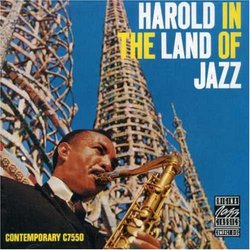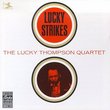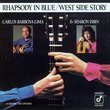| All Artists: Harold Land Title: Harold in the Land of Jazz Members Wishing: 3 Total Copies: 0 Label: Ojc Release Date: 7/1/1991 Genres: Jazz, Pop Style: Bebop Number of Discs: 1 SwapaCD Credits: 1 UPCs: 025218616225, 025218016216, 025218016247, 025218516242, 025218016223 |
Search - Harold Land :: Harold in the Land of Jazz
 | Harold Land Harold in the Land of Jazz Genres: Jazz, Pop
|
Larger Image |
CD DetailsSimilar CDs
|
CD ReviewsBest on any coast Samuel Chell | Kenosha,, WI United States | 05/23/2007 (5 out of 5 stars) "In the liner notes Nat Hentoff quotes respected pianist Victor Feldman as calling Land, who was considering looking for a "day job," the "best tenor on any coast." It's a debatable but defensible statement. Land did not play with the big-toned, attention-commanding authority of many of the boss tenors and innovators, or the dazzling virtuosity of a Sonny Stitt, or the bluesy melodic inventiveness of a Hank Mobley, but to an attentive listener he was all about the music--no tricks, bells and whistles, extraneous vibrato, top tones calling attention to themselves or the performer. No player employs a greater sense of logic and purpose. There's a forward lean to every one of his melodic lines, reminding you of a man on a mission, impatient with the slightest distraction or obstacle to its successful completion. Outside of a naturally virile "edge" to his sound, there's nothing that's forced, one of the reasons, perhaps, that despite having enormous facility that allowed him to be crisp and efficient at any tempo, a listener doesn't become aware of his virtuoso technique until after the fact. If Coltrane had a skyward vision, Land's was horizontal and panoramic--an uncanny ability to take in the whole melodic-harmonic field before him and navigate his course without inviting trouble or waste. No player is more aggressively focused coming out of the chute--the break between the ensemble head and the soloist's first chorus, an unnerving moment that causes many players to fumble, show off, or simply fill up space. Land always hits the ground running, spinning forward and creating all at once, and with such continuity and momentum that the distinction between ensemble and soloist is all but erased ("Nieta," "Smack Up"). His most expressive tool is nothing more than "phrasing." I know of no other tenor player who shapes, contours, expands and contracts his own lines--even individual notes--through the use of plain and simple dynamics as Land does. It's that gift that also makes him a perfect ensemble player, capable of becoming a single voice with any other frontline partner, whether a Clifford Brown or Jack Sheldon. Besides doubling the sound of the other player, he supplies the vibrant, living quality of the head's melodic line (had he recorded on Blue Note, I'm afraid much of this nuance would have been lost). This is a fine date under Harold's own name, approaching but not quite equaling "The Fox." Personally, however, I've discovered his best performances to be those not under his own leadership. "The Curtis Counce Quintet" has to rank as not only his most essential but one of the most impressive recordings by a jazz quintet ever, a time-capsule performance by all five players in whole and in solo. After that, I'd go to the Clifford Brown-Max Roach dates. As for the present session, Rolf Ericson is no Jack Sheldon let alone Clifford Brown, and Leroy Vinnegar doesn't produce the same buoyancy and inspired note choices as Counce. Frank Butler (catch his "conversation" with Ericson during the latter's solo on "Speak Low"!) and, especially, Carl Perkins had few if any peers on their instruments, Perkins with a voice so unique and personal that a listener might have wished for fewer tracks on the present date and more room for him to stretch out." Absolute BeBop Beauty! Windy Dankoff | Santa Fe, NM USA | 11/26/2004 (5 out of 5 stars) "Right up there in my mind with Kind Of Blue as an album to recommend to convert anyone into a jazz lover. For me, it answers the "why" of bebop. Every phrase of Land's tenor sax is an expression of pure, controlled beauty. His group is tight and right, and there's all the variety needed to make a whole presentation of what it's all about." Under-appreciated master Andreas C G | Huntington Beach, CA United States | 04/22/2005 (5 out of 5 stars) "This album is great. I don't know why this guy is not more well-known than he is, possibly because he lived in LA, rather than NYC. Any fan of bebop and hard bop should listen to this album and also "The Fox". Both are great albums that I listed to regularly. Also, you gotta love the picture of him playing in front of the Watts Towers!"
|

 Track Listings (8) - Disc #1
Track Listings (8) - Disc #1
